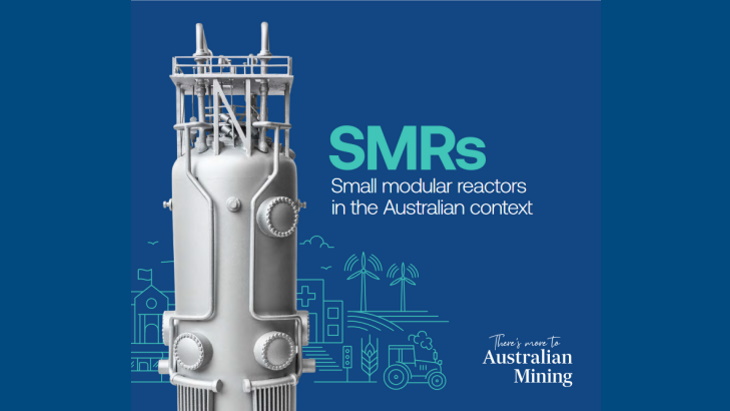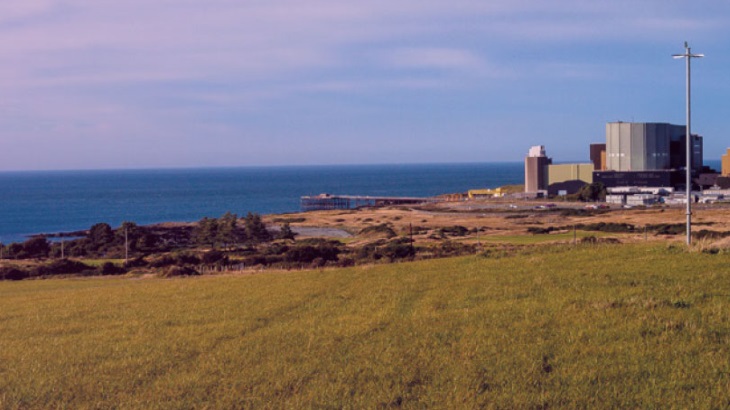GLOW GREEN
SMRs 'ideal fit' for Australian market, report finds
06 October 2021
With Australia moving to decarbonise, it is time to seriously consider a role for advanced nuclear technologies like small modular reactors (SMRs), the head of the Minerals Council of Australia (MCA) said today.
 The new report, authored by Ben Heard (Image: MCA)
The new report, authored by Ben Heard (Image: MCA)CEO Tania Constable's remarks accompanied the MCA's launch of Small Modular Reactors in the Australian Context, a discussion paper authored by Australian nuclear expert Ben Heard which provides an overview of SMRs, their potential role in Australia and likely operating costs. The 33-page document considers three of the "most advanced" SMR designs that are currently undergoing regulatory approval - NuScale's Power Module, GE-Hitachi's BWRX-300 and Terrestrial Energy's Integral Molten Salt Reactor - and their potential use in Australia. By 2030 and beyond, the levelised costs of electricity for those three SMR designs are estimated to be between AUD64 and AUD77 (USD46 and USD56) per MWh.
SMRs are an "ideal fit" for the Australian energy market, the report finds, citing their enhanced safety, lower cost than large-scale nuclear reactors or equivalent energy production methods, configurability, and lower waste production than current reactors. Furthermore, SMR modules have a similar capacity to many of the existing generator units that make up Australia's coal and gas-fired power plants so could easily replace ageing coal or gas-powered turbines without the need for additional grid investment, it says.
"Even with conservative assumptions that include higher than expected construction costs, SMRs could be Australia's lowest cost 24/7 zero emission power source that underpins reliable and secure electricity supplies," Constable said.
"The MCA has long advocated that Australia needs to consider zero emission nuclear energy, along with carbon capture use and storage, and renewable energy, as the country moves to decarbonise the economy.
"Changes in the economic, trade, security, policy and technology environments in which Australia operates means that all options for low-carbon energy sources must be considered. SMRs offer part of the solution to addressing this necessary requirement."
With one third of the world's uranium reserves, Australia's "significant" uranium mining sector supplies about 10% of global demand, Constable said. This would be enough uranium to power "almost the entire output of the national electricity market" with low cost zero emission power, she added.
"Despite this, outdated federal and state bans on nuclear power have seen Australia fall behind as the only G-20 country without access to nuclear energy or plans to develop it," she said. "Australia should take advantage of growing international interest in nuclear energy and look to expand its already significant uranium sector."
Although the Australian Nuclear Science and Technology Organisation (ANSTO) has operated nuclear reactors for research and isotope production since the 1950s and currently operates the OPAL reactor, the use of nuclear power in the country is currently prohibited by federal and state-level regulations. A parliamentary committee in 2019 recommended that the government should consider a partial lifting of the current moratorium on nuclear energy to allow the deployment of new and emerging technologies. It is embarking on the process to acquire nuclear submarines under the tripartite AUKUS partnership with the UK and the USA, although Prime Minister Scott Morrison at last month's AUKUS launch said Australia is not seeking to acquire nuclear weapons or establish a civil nuclear capability.
UK needs new nuclear, says Prime Minister
04 October 2021
The UK government is in discussions regarding proposals for a new nuclear power plant at Wylfa on Anglesey, British Prime Minister Boris Johnson confirmed on 2 October in an interview with BBC Wales. He said previous governments in the country "have refused to take the tough decisions on nuclear for too long." Meanwhile, EDF Energy has called for the government to make prompt decisions regarding the Sizewell C project.
 The existing Wylfa nuclear power plant, which is being decommissioned (Image: Magnox Ltd)
The existing Wylfa nuclear power plant, which is being decommissioned (Image: Magnox Ltd)Johnson said the cost of energy can be held down "if we make the big long-term investments that we need to do now in clean power generation. So, whether that's wind - where we're going up to 40 GW by 2030, we can do even more - or nuclear."
He added, "We do need to go forward with more nuclear power. I do think it should be part of our baseload, a big part. And that's why yes, of course, we're looking at Wylfa and lots of other projects."
Reacting to the Prime Minister's comments, Tom Greatrex, Chief Executive of the Nuclear Industry Association, said: "The PM is right to back long-term investments in nuclear and to take the big decisions. We need new nuclear to secure our energy future with clean, reliable, British power. We look forward to the government bringing forward legislation to do just that this autumn."
Proposed projects
In January this year, Horizon Nuclear Power - the UK project developer owned by Japan's Hitachi - withdrew its application for planning consent for the construction of two UK Advanced Boiling Water Reactor units at Wylfa.
On 23 September, the Welsh Affairs Committee held a one-off evidence session hearing the latest on a new nuclear power plant at Wylfa Newydd in Anglesey, following the failure of the Horizon project. MPs examined the support needed by the sector to develop new power stations and the likelihood of a new developer delivering a nuclear power station at Wylfa Newydd.
The committee heard from representatives of the USA's Bechtel and Westinghouse - who are proposing to construct AP1000 reactors at Wylfa - and UK-based Shearwater Energy, who is proposing to develop a wind-small modular reactor and hydrogen production hybrid energy project at the site.
Sizewell C decisions
EDF Energy has said it is "urgent" the UK government makes key decisions on its proposed Sizewell C nuclear power plant.
In an interview with the Financial Times, the company's CEO Simone Rossi said EDF Energy wants to make a final investment decision on the project by the end of 2022. He said the government must first clarify which partners will be permitted to participate in the project and the preferred funding model.
Sizewell C will be a near replica of Hinkley Point C (HPC), which EDF Energy is building in Somerset and, like HPC, it will be able to supply 7% of the UK's electricity once it enters commercial operation. EDF and China General Nuclear (CGN) respectively own 80% and 20% of the Sizewell C project. However, UK ministers are reportedly considering ways to remove CGN from UK nuclear projects.
The government is considering a regulated asset based model for Sizewell C that EDF Energy says would reduce the cost of new nuclear power plant projects by having consumers pay upfront through their energy bills.
Researched and written by World Nuclear News
No comments:
Post a Comment